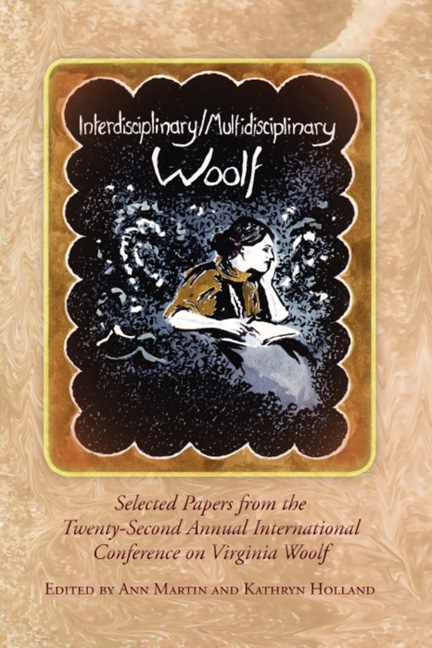Book contents
- Frontmatter
- Contents
- Introduction to Interdisciplinary/Multidisciplinary Woolf
- Acknowledgments
- List of Abbreviations
- History, Materiality, Multiplicity
- Multidisciplinary Woolf / Multiple Woolfs?
- Woolf, History, Us
- “Full of Experiments and Reforms”: Virginia Woolf, John Maynard Keynes, and the Impossibility of Economic Modeling
- Desiring Statues and Ambiguous Sexualities in Jacob's Room
- Challenging the Family Script: Woolf, the Stephen Family, and Victorian Evangelical Theology
- History as Scaffolding: Woolf's Use of The Times in The Years
- Vincent van Gogh, Virginia Woolf, and Old Shoes: A Cross-Cultural Iconography of Historical Truama from the Great War to the Iraq War
- Stopped at the Border: Virginia Woolf and the Criminalization of Dissent in Democratic Societies
- “Q. And babies? A. And babies”: On Pacifism, Visual Truama, and the Body Heap
- Photography, History, and Memoir of the Spanish Civil War: Interdisciplinary Views
- Patterns, Practices, Principles
- Art, Influence, Embodiment
- Publishing, Politics, Publics
- Notes on Contributors
- Conference Program
Stopped at the Border: Virginia Woolf and the Criminalization of Dissent in Democratic Societies
from History, Materiality, Multiplicity
- Frontmatter
- Contents
- Introduction to Interdisciplinary/Multidisciplinary Woolf
- Acknowledgments
- List of Abbreviations
- History, Materiality, Multiplicity
- Multidisciplinary Woolf / Multiple Woolfs?
- Woolf, History, Us
- “Full of Experiments and Reforms”: Virginia Woolf, John Maynard Keynes, and the Impossibility of Economic Modeling
- Desiring Statues and Ambiguous Sexualities in Jacob's Room
- Challenging the Family Script: Woolf, the Stephen Family, and Victorian Evangelical Theology
- History as Scaffolding: Woolf's Use of The Times in The Years
- Vincent van Gogh, Virginia Woolf, and Old Shoes: A Cross-Cultural Iconography of Historical Truama from the Great War to the Iraq War
- Stopped at the Border: Virginia Woolf and the Criminalization of Dissent in Democratic Societies
- “Q. And babies? A. And babies”: On Pacifism, Visual Truama, and the Body Heap
- Photography, History, and Memoir of the Spanish Civil War: Interdisciplinary Views
- Patterns, Practices, Principles
- Art, Influence, Embodiment
- Publishing, Politics, Publics
- Notes on Contributors
- Conference Program
Summary
August 2012:
Two months may seem like a long time to ruminate upon, what must be to you, a minor incident. I do not even know if you remember me. Certainly, in your mind, no response is necessary. You ostensibly posed me no profound question; your interrogations were routine, pedestrian, and after being answered and verified, required no ongoing conversations or follow up discussion. When you asked me at the border between Canada and the United States, “Why are you entering Canada?” and “What are you presenting on at the Virginia Woolf Conference?” I do not think that you understood that even if your language did not provoke a dialogue upon a larger, more abstract topic— your actions—call certain philosophical and ethical problems into being, and manifest theoretical quandaries that provoke larger thought. So, it is the questions that your actions posed to which I am responding—questions that Virginia Woolf, in Three Guineas, pondered eighty-four years earlier: what does it mean to be a citizen? What does it mean to uphold the law? What is this “patriotism” that we speak of? In whose benefit does the phrase “our country” work? What is our obligation to “our country?” And ultimately, in Woolf's words, “How in your opinion are we to prevent war?”
This letter, modeled upon Woolf's series of letters in Three Guineas, is not only an address to the issues raised by my experience of entering Canada, but is also written in homage to Virginia Woolf and Three Guineas. It is truly ironic that, going to a conference to present on a peace panel whose subject was Three Guineas, you would embody all that Woolf confronts in her “Communist Manifesto for women,” and that you made real all the concerns for masculinist military posturing that she raised. I know that before you met Conor Tomás Reed and me, Woolf was an author you had only heard of in passing, and that you were completely unfamiliar with Three Guineas. Permit me to take this opportunity to introduce you to a text that is essential to you and your line of work, even if you do not yet know it.
But—wait! You may have no idea as to how I see you, and you may very well have forgotten Conor and me.
- Type
- Chapter
- Information
- Interdisciplinary/Multidisciplinary Woolf , pp. 57 - 67Publisher: Liverpool University PressPrint publication year: 2013



